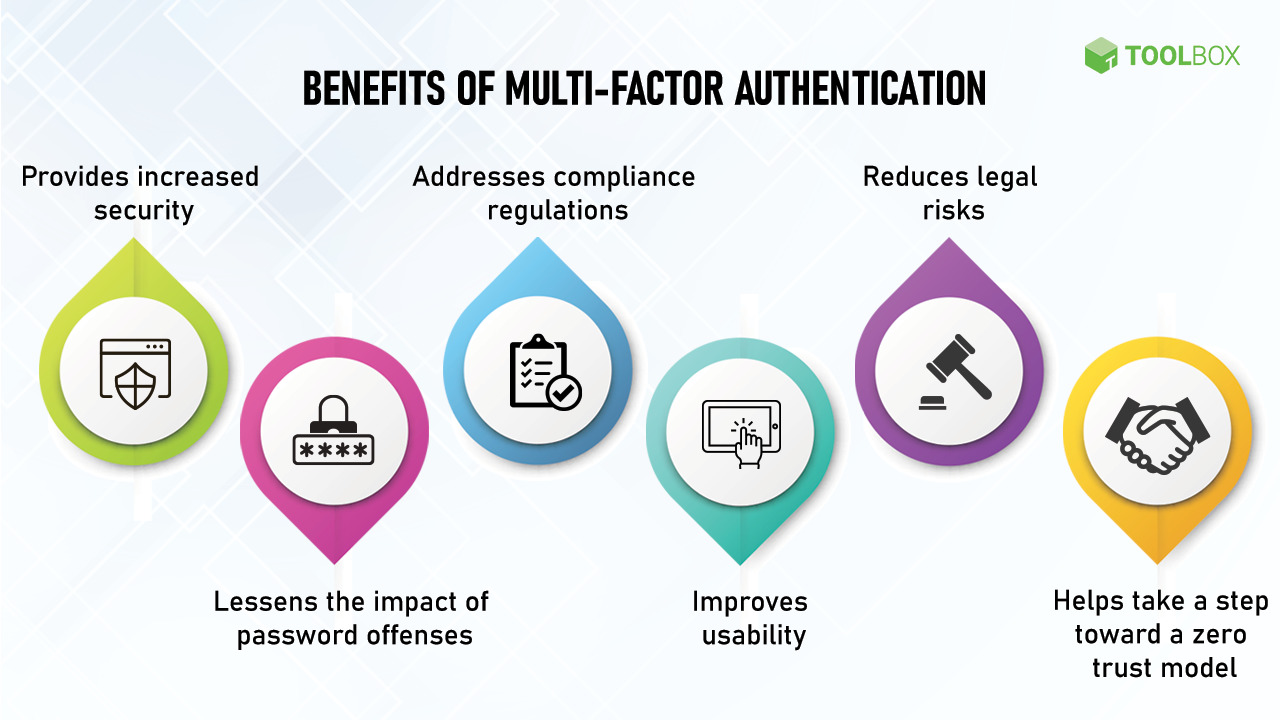The Benefits of Multi-Factor Authentication
Multi-factor authentication (MFA) is a security measure that provides an additional layer of protection to your online accounts. It goes beyond traditional username and password authentication by requiring users to provide multiple forms of identification. In this article, we will explore the numerous benefits of implementing MFA and how it can enhance the security of your online presence.
Enhanced Security
MFA significantly strengthens the security of your accounts by adding an extra layer of protection. With traditional username and password authentication, a single compromised credential can lead to unauthorized access. However, with MFA, even if an attacker manages to steal your password, they would still need to provide additional authentication factors, such as a fingerprint scan, a one-time password, or a security token. This greatly reduces the risk of unauthorized access and protects your sensitive information.
Protection Against Phishing Attacks
Phishing attacks are a common method used by cybercriminals to trick users into revealing their login credentials. By impersonating a legitimate website or service, attackers aim to deceive users into entering their username and password on a fake login page. However, with MFA in place, even if a user falls victim to a phishing attack and unknowingly provides their credentials, the attacker would still require the additional authentication factors, which they are unlikely to possess. This acts as a strong deterrent against phishing attacks and provides an additional layer of defense.
Prevention of Credential Stuffing
Credential stuffing is a technique where attackers use lists of stolen usernames and passwords to gain unauthorized access to multiple accounts. Since many users reuse the same credentials across multiple platforms, a breach in one service can lead to compromises in others. However, with MFA, even if an attacker possesses the correct username and password combination, they would still be unable to access the account without the additional authentication factors. This effectively mitigates the risk of credential stuffing attacks and protects your accounts from being compromised due to password reuse.
Compliance with Regulatory Requirements
Implementing MFA can help organizations comply with various regulatory requirements, especially in industries that handle sensitive data. Regulations such as the General Data Protection Regulation (GDPR) and the Payment Card Industry Data Security Standard (PCI DSS) often require organizations to implement strong security measures to protect user data. MFA is considered one of the best practices for securing user accounts and can aid in meeting these compliance requirements.
Improved User Experience
Contrary to popular belief, MFA does not necessarily result in a cumbersome user experience. Modern MFA solutions offer a variety of convenient authentication methods, such as biometrics, push notifications, or hardware tokens. These methods are often more user-friendly than traditional passwords and can provide a seamless and secure login experience. By implementing MFA, organizations can enhance the overall user experience while maintaining a high level of security.

Multi-Factor Authentication provides a multitude of benefits that significantly enhance the security of your online accounts. By adding an extra layer of protection, MFA mitigates the risks associated with compromised credentials, phishing attacks, and credential stuffing. Furthermore, it helps organizations comply with regulatory requirements and offers an improved user experience. Implementing MFA is a critical step towards safeguarding your sensitive information in today’s digital landscape.
Frequently Asked Questions
1. What is multi-factor authentication (MFA)?
Multi-factor authentication is a security method that requires users to provide at least two different forms of identification before granting access to a system or account.
2. What are the benefits of using multi-factor authentication?
Multi-factor authentication provides an additional layer of security by adding an extra step to the login process, making it more difficult for unauthorized individuals to access your accounts.
3. How does multi-factor authentication enhance security?
By requiring multiple forms of identification, such as a password, fingerprint, or security token, multi-factor authentication reduces the chances of unauthorized access even if one factor is compromised.
4. Can multi-factor authentication prevent password theft?
Yes, multi-factor authentication can significantly reduce the risk of password theft. Even if someone manages to obtain your password, they would still need access to the additional factors to gain entry.
5. Is multi-factor authentication easy to set up?
Setting up multi-factor authentication varies depending on the service or platform, but most providers offer straightforward instructions and user-friendly interfaces to guide you through the process.
6. Does multi-factor authentication slow down the login process?
While multi-factor authentication adds an extra step to the login process, it generally only takes a few seconds to complete. The added security outweighs the minimal inconvenience.
7. Can multi-factor authentication be used for all online accounts?
Many online platforms and services now offer multi-factor authentication as an option, including email providers, social media platforms, and banking institutions. However, not all accounts may support this feature.
8. Is multi-factor authentication only for businesses?
No, multi-factor authentication is beneficial for both businesses and individual users. It is an effective security measure for protecting personal information, financial accounts, and online identities.
9. What happens if I lose my multi-factor authentication device?
If you lose your multi-factor authentication device, you should immediately contact the service provider to disable the device and regain access to your account. They will guide you through the necessary steps to recover your account.
10. Can multi-factor authentication be used on mobile devices?
Yes, multi-factor authentication can be used on mobile devices. Many services offer authentication apps or SMS verification codes as one of the factors, making it convenient for users to secure their accounts on smartphones and tablets.




